模块1 Unit 2 Growing pains Word power & Grammar
文档属性
| 名称 | 模块1 Unit 2 Growing pains Word power & Grammar | 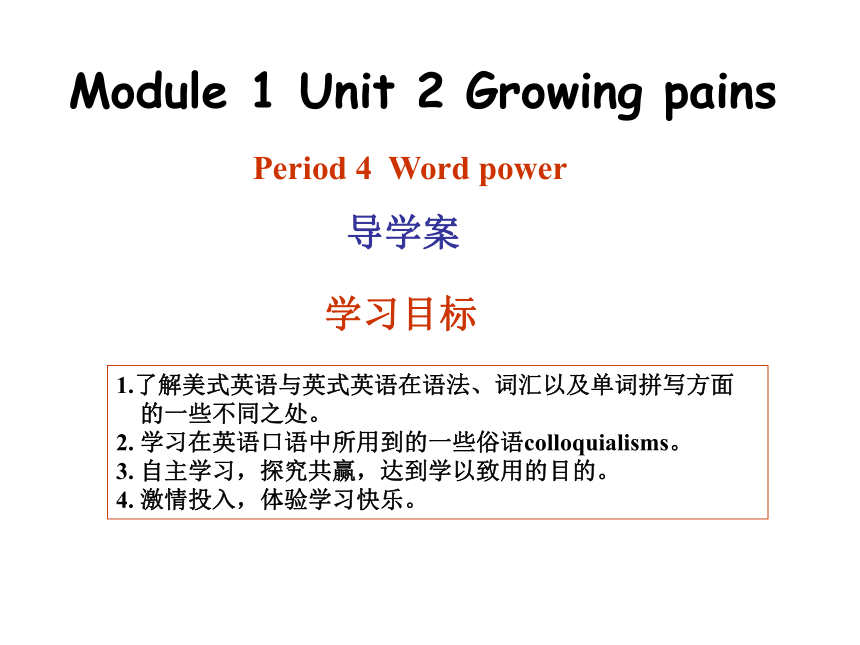 | |
| 格式 | zip | ||
| 文件大小 | 62.7KB | ||
| 资源类型 | 教案 | ||
| 版本资源 | 牛津译林版 | ||
| 科目 | 英语 | ||
| 更新时间 | 2012-09-23 16:00:03 | ||
图片预览

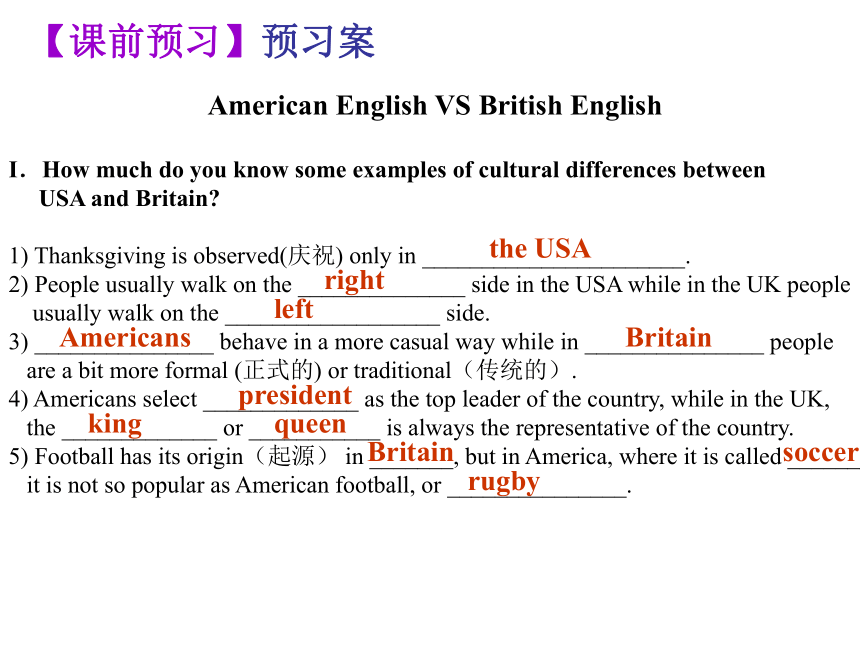
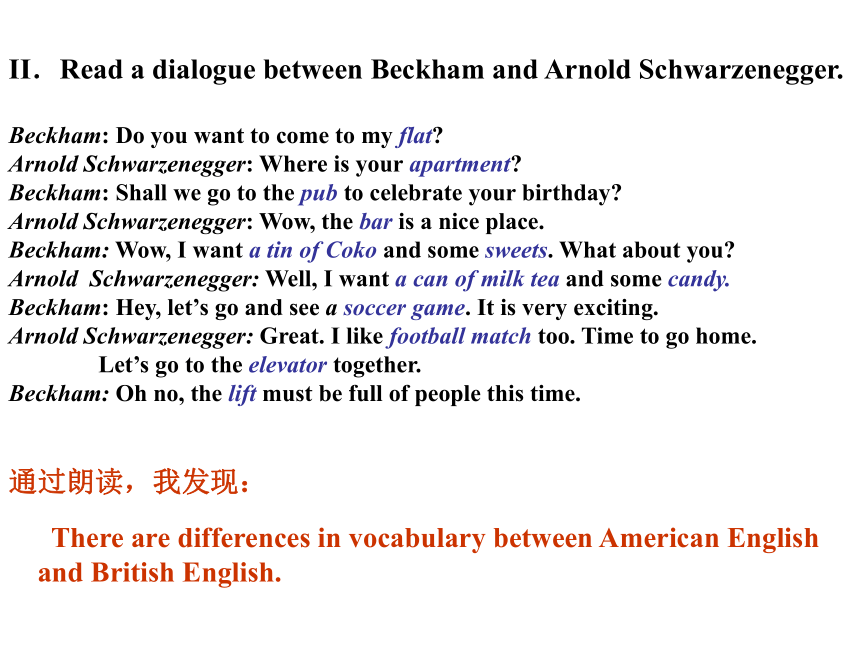
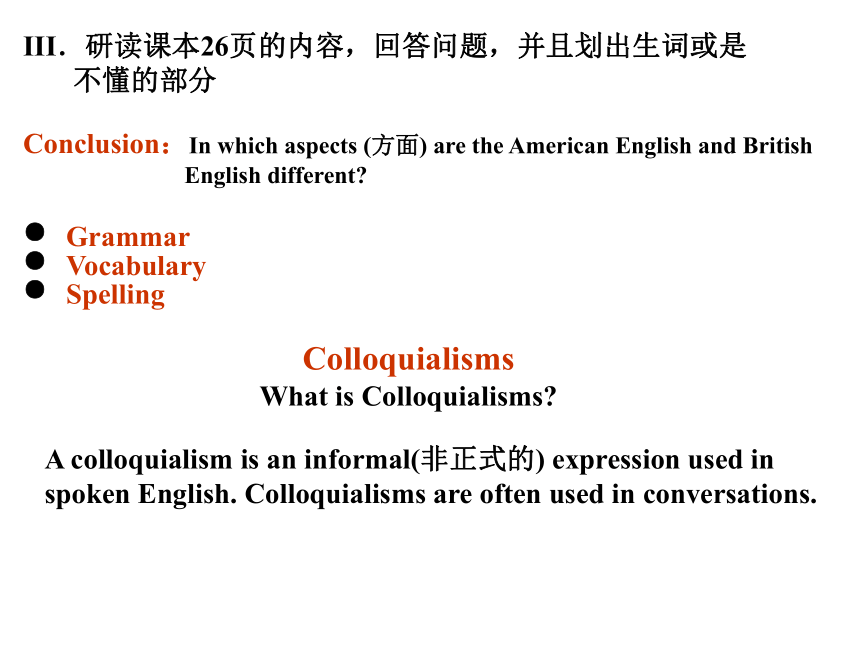
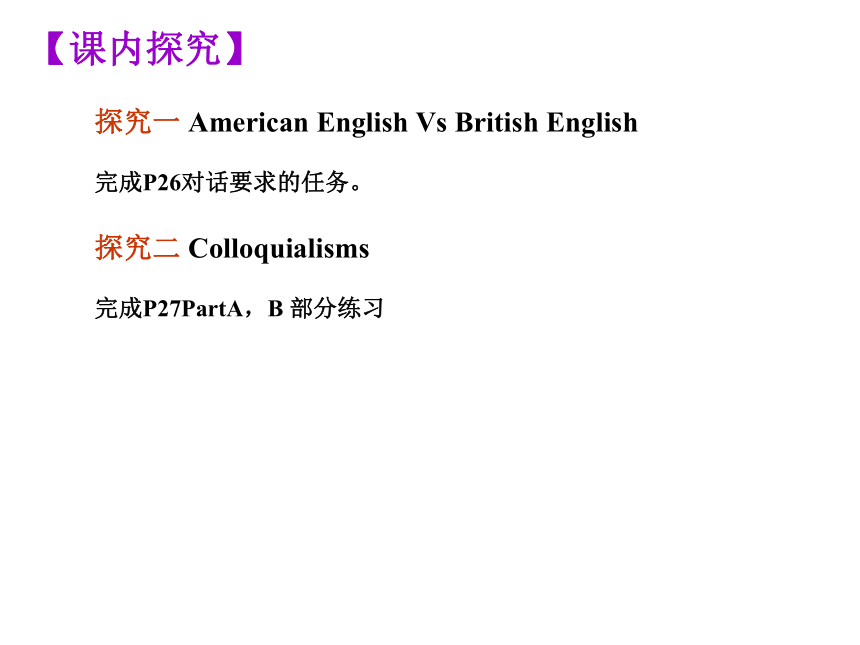
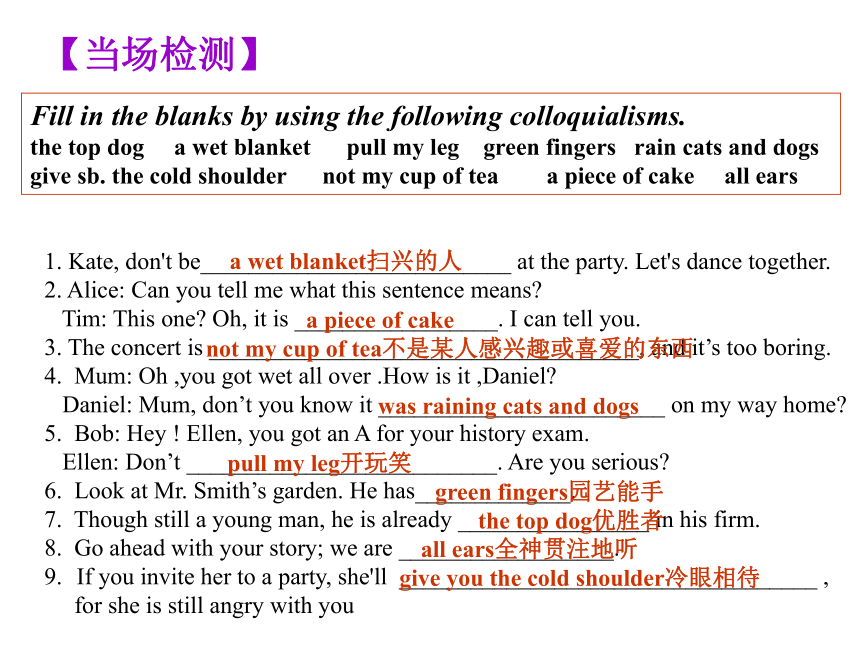
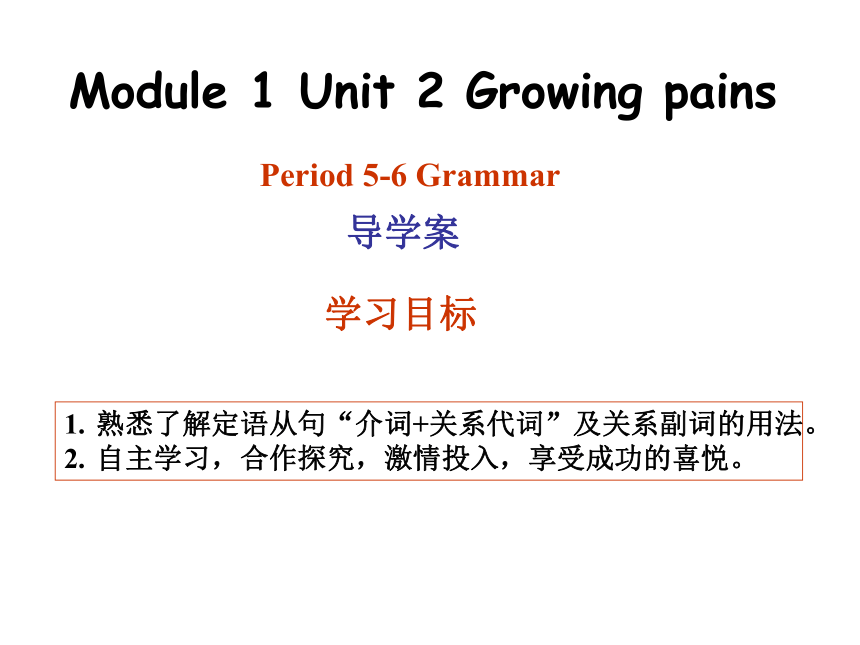
文档简介
(共15张PPT)
Module 1 Unit 2 Growing pains
Period 4 Word power
学习目标
导学案
1.了解美式英语与英式英语在语法、词汇以及单词拼写方面
的一些不同之处。
2. 学习在英语口语中所用到的一些俗语colloquialisms。
3. 自主学习,探究共赢,达到学以致用的目的。
4. 激情投入,体验学习快乐。
【课前预习】预习案
American English VS British English
I.How much do you know some examples of cultural differences between
USA and Britain
1) Thanksgiving is observed(庆祝) only in ______________________.
2) People usually walk on the ______________ side in the USA while in the UK people
usually walk on the __________________ side.
3) _______________ behave in a more casual way while in _______________ people
are a bit more formal (正式的) or traditional(传统的).
4) Americans select _____________ as the top leader of the country, while in the UK,
the _____________ or ___________ is always the representative of the country.
5) Football has its origin(起源) in _______, but in America, where it is called __________,
it is not so popular as American football, or _______________.
the USA
right
left
Americans
Britain
president
king
queen
Britain
soccer
rugby
II.Read a dialogue between Beckham and Arnold Schwarzenegger.
Beckham: Do you want to come to my flat
Arnold Schwarzenegger: Where is your apartment
Beckham: Shall we go to the pub to celebrate your birthday
Arnold Schwarzenegger: Wow, the bar is a nice place.
Beckham: Wow, I want a tin of Coko and some sweets. What about you
Arnold Schwarzenegger: Well, I want a can of milk tea and some candy.
Beckham: Hey, let’s go and see a soccer game. It is very exciting.
Arnold Schwarzenegger: Great. I like football match too. Time to go home.
Let’s go to the elevator together.
Beckham: Oh no, the lift must be full of people this time.
通过朗读,我发现:
There are differences in vocabulary between American English
and British English.
III.研读课本26页的内容,回答问题,并且划出生词或是
不懂的部分
Conclusion:In which aspects (方面) are the American English and British
English different
●
●
●
Colloquialisms
What is Colloquialisms
Grammar
Vocabulary
Spelling
A colloquialism is an informal(非正式的) expression used in
spoken English. Colloquialisms are often used in conversations.
【课内探究】
探究一 American English Vs British English
完成P26对话要求的任务。
探究二 Colloquialisms
完成P27PartA,B 部分练习
【当场检测】
Fill in the blanks by using the following colloquialisms.
the top dog a wet blanket pull my leg green fingers rain cats and dogs
give sb. the cold shoulder not my cup of tea a piece of cake all ears
1. Kate, don't be__________________________ at the party. Let's dance together.
2. Alice: Can you tell me what this sentence means
Tim: This one Oh, it is _________________. I can tell you.
3. The concert is ____________________________________, and it’s too boring.
4. Mum: Oh ,you got wet all over .How is it ,Daniel
Daniel: Mum, don’t you know it ________________________ on my way home
5. Bob: Hey ! Ellen, you got an A for your history exam.
Ellen: Don’t __________________________. Are you serious
6. Look at Mr. Smith’s garden. He has_____________.
7. Though still a young man, he is already ________________ in his firm.
8. Go ahead with your story; we are __________________.
If you invite her to a party, she'll ___________________________________ ,
for she is still angry with you
a wet blanket扫兴的人
a piece of cake
was raining cats and dogs
pull my leg开玩笑
green fingers园艺能手
the top dog优胜者
all ears全神贯注地听
give you the cold shoulder冷眼相待
not my cup of tea不是某人感兴趣或喜爱的东西
Module 1 Unit 2 Growing pains
Period 5-6 Grammar
学习目标
导学案
熟悉了解定语从句“介词+关系代词”及关系副词的用法。
自主学习,合作探究,激情投入,享受成功的喜悦。
I. 让我们先复习一下在第一单元学过的定语从句关系代词的用法。
【课前预习】预习案
单选
1. I like the second football match __________ was held last week.
A. which B. who C. that D. /
2. The wolves hid themselves in the places __________ couldn’t be found.
A. that B. where C. in which D. in that
3. Is this the factory __________ you visited the other day
A. that B. where C. in which D. the one
4. Is this factory __________ some foreign friends visited last Friday
A. that B. where C. which D. the one
5. I’ll tell you __________ he told me last week.
A. all which B. that C. all that D. which
6. Can you lend me the novel __________ the other day
A. that you talked B. you talked about it
C. which you talked with D. you talked about
7. The girl __________ an English song in the next room is Tom’s sister.
A. who is singing B. is singing C. sang D. was singing
8. Those __________ not only from books but also through practice will succeed.
A. learn B. who C. that learns D. who learn
9. Didn’t you see the man __________
A. I nodded just now B. whom I nodded just now
C. I nodded to him just now D. I nodded to just now
10. May the fourth is the day __________ we Chinese people will never forget.
A. which B. when C. on which D. about which
11. There is only one thing __________ I can do.
A. what B. that C. all D. which
12. We’re talking about the piano and the pianist ___ were in the concert we attended
last night.
A. which B. whom C. who D. that
13. That tree, __________ branches(枝) are almost bare(光秃的), is very old.
A. whose B. of which C. in which D. on which
14. It is the Suez Canal __________ separates Asia from Africa.
A. which B. where C. that D. what
15. Under the bridge, however, almost directly below, ___ was a small canoe(独木舟),
with a boy in it.
A. there B. where C. it D. which
16. The great day we looked forward to __________ at last.
A. come B. came C. coming D. comes
【课内探究】
语法探究 分组合作 讨论解疑 展示点评 质疑探究
探究一 介词+关系代词(which/whom)
朗读下列句型,归纳总结定语从句“介词+关系代词(which/whom)”的用法
I.
1. We thought you were a person from whom we could expect good decisions.
2. The money with which you were to buy dog food is gone.
Conclusion 1(归纳):We use a preposition (介词) to begin an attributive
clause when the relative pronoun (关系代词) is the __________ (此处填句子成分)
of the preposition.
object宾语
II.
1. Dad is a person (whom/that/who) I can easily talk to.
2. Daniel is the person (whom/that/who) I want to make friends with.
3. Is this the play (which/that) you were talking about just now
4. The subject (which/that) Eric is interested in is Physics.
5. Literature is a subject (which/that) I know little about.
Conclusion 2(归纳):If the proposition is_______________
the attributive clause, whom and which can be replaced by that and who.
We also can _________ them in this case(在这种情况下).
III. ★ 特殊情况
We had a good laugh over the strange way (that/in which) Matt solved the
problem.
2. I didn’t like the way (that/ in which) she talked to me.
3. The way (that/ in which) he teaches English is interesting.
Conclusion 3(归纳):We use __________ or ______________ to begin
an attributive clause when the antecedent (先行词) is _________. We can also
__________ the relative pronouns.
at the end of
leave out
that
in which
way
leave out
探究二 关系副词 when, where and why 的用法
朗读下列句型,归纳总结定语从句关系副词 when, where and why的用法
I.
1. Do you remember the day when we left you in charge
2. I often think of the moment when I first saw her.
3. I remember the time when Eric won that speech competition.
Conclusion 1(归纳):We often use relative adverb(关系副词) _________ to begin an attributive clause when the antecedents (先行词) are such words like time, moment, day, season and year.
II.
The police searched the house where the terrible accident happened.
2. Mike wants to work in a country where there are a lot of forests.
3. Is Shanghai the city where he was born
4. This is not a family where bad behavior can be tolerated.
Conclusion 2(归纳):We often use relative adverb(关系副词) _________ to begin an attributive clause when the antecedents (先行词) are such words like place, house, city, country and world.
when
where
III.
I don’t know the reason why the house is so dirty.
I won’t listen to the reason why you didn’t do your homework.
Conclusion 3(归纳):We often use relative adverb(关系副词) _________ to begin an attributive clause when the antecedents (先行词) is _____________.
IV.
The study is the place where / in which I often have talks with my father.
This is the reason why / for which my parents got home earlier.
It rained the whole day when/ on which he travelled with his family.
Conclusion 4(归纳):Relative adverb(关系副词) can be ________ by a preposition + which.
why
reason
replaced
【当场检测】完成P29及P31所有练习。
【能力提升】单选
1. Don’t talk about such things of __________ you are not sure.
A. which B. what C. as D. those
2. The freezing point is the temperature __________ water changes into ice.
A. at which B. on that C. in which D. of what
3. He has lost the key to the drawer __________ the papers are kept.
A. where B. in which C. under which D. which
4. The train __________ she was travelling was late.
A. which B. where C. on which D. in that
5. Antarctic __________ we know very little is covered with thick ice all the
year round.
A. which B. where C. that D. about which
6. He has two sons, __________ work as chemists.
A. two of whom B. both of whom C. both of which D. all of whom
7. He is a man of great experience, __________ much can be learned.
A. who B. that C. from which D. from whom
8. The two things __________ they felt very proud are Jim’s gold watch and
Della’s hair.
A. about which B. of which C. in which D. for which
9. I have many books, some of __________ are on chemistry.
A. them B. that C. which D. those
10. I don’t like __________ you speak to her.
A. the way B. the way in that C. the way which D. the way of which
11. Is this the factory __________ he worked ten years ago
A. that B. where C. which D. the one
12. We are going to spend the Spring Festival in Guangzhou, ____________
live my grandparents and some relatives.
A. which B. that C. who D. where
13. Is that the reason __________ you are in favour of the proposal
A. which B. what C. why D. for that
14. Who can think of a situation __________ this idiom can be used
A. which B. that C. where D. in that
Module 1 Unit 2 Growing pains
Period 4 Word power
学习目标
导学案
1.了解美式英语与英式英语在语法、词汇以及单词拼写方面
的一些不同之处。
2. 学习在英语口语中所用到的一些俗语colloquialisms。
3. 自主学习,探究共赢,达到学以致用的目的。
4. 激情投入,体验学习快乐。
【课前预习】预习案
American English VS British English
I.How much do you know some examples of cultural differences between
USA and Britain
1) Thanksgiving is observed(庆祝) only in ______________________.
2) People usually walk on the ______________ side in the USA while in the UK people
usually walk on the __________________ side.
3) _______________ behave in a more casual way while in _______________ people
are a bit more formal (正式的) or traditional(传统的).
4) Americans select _____________ as the top leader of the country, while in the UK,
the _____________ or ___________ is always the representative of the country.
5) Football has its origin(起源) in _______, but in America, where it is called __________,
it is not so popular as American football, or _______________.
the USA
right
left
Americans
Britain
president
king
queen
Britain
soccer
rugby
II.Read a dialogue between Beckham and Arnold Schwarzenegger.
Beckham: Do you want to come to my flat
Arnold Schwarzenegger: Where is your apartment
Beckham: Shall we go to the pub to celebrate your birthday
Arnold Schwarzenegger: Wow, the bar is a nice place.
Beckham: Wow, I want a tin of Coko and some sweets. What about you
Arnold Schwarzenegger: Well, I want a can of milk tea and some candy.
Beckham: Hey, let’s go and see a soccer game. It is very exciting.
Arnold Schwarzenegger: Great. I like football match too. Time to go home.
Let’s go to the elevator together.
Beckham: Oh no, the lift must be full of people this time.
通过朗读,我发现:
There are differences in vocabulary between American English
and British English.
III.研读课本26页的内容,回答问题,并且划出生词或是
不懂的部分
Conclusion:In which aspects (方面) are the American English and British
English different
●
●
●
Colloquialisms
What is Colloquialisms
Grammar
Vocabulary
Spelling
A colloquialism is an informal(非正式的) expression used in
spoken English. Colloquialisms are often used in conversations.
【课内探究】
探究一 American English Vs British English
完成P26对话要求的任务。
探究二 Colloquialisms
完成P27PartA,B 部分练习
【当场检测】
Fill in the blanks by using the following colloquialisms.
the top dog a wet blanket pull my leg green fingers rain cats and dogs
give sb. the cold shoulder not my cup of tea a piece of cake all ears
1. Kate, don't be__________________________ at the party. Let's dance together.
2. Alice: Can you tell me what this sentence means
Tim: This one Oh, it is _________________. I can tell you.
3. The concert is ____________________________________, and it’s too boring.
4. Mum: Oh ,you got wet all over .How is it ,Daniel
Daniel: Mum, don’t you know it ________________________ on my way home
5. Bob: Hey ! Ellen, you got an A for your history exam.
Ellen: Don’t __________________________. Are you serious
6. Look at Mr. Smith’s garden. He has_____________.
7. Though still a young man, he is already ________________ in his firm.
8. Go ahead with your story; we are __________________.
If you invite her to a party, she'll ___________________________________ ,
for she is still angry with you
a wet blanket扫兴的人
a piece of cake
was raining cats and dogs
pull my leg开玩笑
green fingers园艺能手
the top dog优胜者
all ears全神贯注地听
give you the cold shoulder冷眼相待
not my cup of tea不是某人感兴趣或喜爱的东西
Module 1 Unit 2 Growing pains
Period 5-6 Grammar
学习目标
导学案
熟悉了解定语从句“介词+关系代词”及关系副词的用法。
自主学习,合作探究,激情投入,享受成功的喜悦。
I. 让我们先复习一下在第一单元学过的定语从句关系代词的用法。
【课前预习】预习案
单选
1. I like the second football match __________ was held last week.
A. which B. who C. that D. /
2. The wolves hid themselves in the places __________ couldn’t be found.
A. that B. where C. in which D. in that
3. Is this the factory __________ you visited the other day
A. that B. where C. in which D. the one
4. Is this factory __________ some foreign friends visited last Friday
A. that B. where C. which D. the one
5. I’ll tell you __________ he told me last week.
A. all which B. that C. all that D. which
6. Can you lend me the novel __________ the other day
A. that you talked B. you talked about it
C. which you talked with D. you talked about
7. The girl __________ an English song in the next room is Tom’s sister.
A. who is singing B. is singing C. sang D. was singing
8. Those __________ not only from books but also through practice will succeed.
A. learn B. who C. that learns D. who learn
9. Didn’t you see the man __________
A. I nodded just now B. whom I nodded just now
C. I nodded to him just now D. I nodded to just now
10. May the fourth is the day __________ we Chinese people will never forget.
A. which B. when C. on which D. about which
11. There is only one thing __________ I can do.
A. what B. that C. all D. which
12. We’re talking about the piano and the pianist ___ were in the concert we attended
last night.
A. which B. whom C. who D. that
13. That tree, __________ branches(枝) are almost bare(光秃的), is very old.
A. whose B. of which C. in which D. on which
14. It is the Suez Canal __________ separates Asia from Africa.
A. which B. where C. that D. what
15. Under the bridge, however, almost directly below, ___ was a small canoe(独木舟),
with a boy in it.
A. there B. where C. it D. which
16. The great day we looked forward to __________ at last.
A. come B. came C. coming D. comes
【课内探究】
语法探究 分组合作 讨论解疑 展示点评 质疑探究
探究一 介词+关系代词(which/whom)
朗读下列句型,归纳总结定语从句“介词+关系代词(which/whom)”的用法
I.
1. We thought you were a person from whom we could expect good decisions.
2. The money with which you were to buy dog food is gone.
Conclusion 1(归纳):We use a preposition (介词) to begin an attributive
clause when the relative pronoun (关系代词) is the __________ (此处填句子成分)
of the preposition.
object宾语
II.
1. Dad is a person (whom/that/who) I can easily talk to.
2. Daniel is the person (whom/that/who) I want to make friends with.
3. Is this the play (which/that) you were talking about just now
4. The subject (which/that) Eric is interested in is Physics.
5. Literature is a subject (which/that) I know little about.
Conclusion 2(归纳):If the proposition is_______________
the attributive clause, whom and which can be replaced by that and who.
We also can _________ them in this case(在这种情况下).
III. ★ 特殊情况
We had a good laugh over the strange way (that/in which) Matt solved the
problem.
2. I didn’t like the way (that/ in which) she talked to me.
3. The way (that/ in which) he teaches English is interesting.
Conclusion 3(归纳):We use __________ or ______________ to begin
an attributive clause when the antecedent (先行词) is _________. We can also
__________ the relative pronouns.
at the end of
leave out
that
in which
way
leave out
探究二 关系副词 when, where and why 的用法
朗读下列句型,归纳总结定语从句关系副词 when, where and why的用法
I.
1. Do you remember the day when we left you in charge
2. I often think of the moment when I first saw her.
3. I remember the time when Eric won that speech competition.
Conclusion 1(归纳):We often use relative adverb(关系副词) _________ to begin an attributive clause when the antecedents (先行词) are such words like time, moment, day, season and year.
II.
The police searched the house where the terrible accident happened.
2. Mike wants to work in a country where there are a lot of forests.
3. Is Shanghai the city where he was born
4. This is not a family where bad behavior can be tolerated.
Conclusion 2(归纳):We often use relative adverb(关系副词) _________ to begin an attributive clause when the antecedents (先行词) are such words like place, house, city, country and world.
when
where
III.
I don’t know the reason why the house is so dirty.
I won’t listen to the reason why you didn’t do your homework.
Conclusion 3(归纳):We often use relative adverb(关系副词) _________ to begin an attributive clause when the antecedents (先行词) is _____________.
IV.
The study is the place where / in which I often have talks with my father.
This is the reason why / for which my parents got home earlier.
It rained the whole day when/ on which he travelled with his family.
Conclusion 4(归纳):Relative adverb(关系副词) can be ________ by a preposition + which.
why
reason
replaced
【当场检测】完成P29及P31所有练习。
【能力提升】单选
1. Don’t talk about such things of __________ you are not sure.
A. which B. what C. as D. those
2. The freezing point is the temperature __________ water changes into ice.
A. at which B. on that C. in which D. of what
3. He has lost the key to the drawer __________ the papers are kept.
A. where B. in which C. under which D. which
4. The train __________ she was travelling was late.
A. which B. where C. on which D. in that
5. Antarctic __________ we know very little is covered with thick ice all the
year round.
A. which B. where C. that D. about which
6. He has two sons, __________ work as chemists.
A. two of whom B. both of whom C. both of which D. all of whom
7. He is a man of great experience, __________ much can be learned.
A. who B. that C. from which D. from whom
8. The two things __________ they felt very proud are Jim’s gold watch and
Della’s hair.
A. about which B. of which C. in which D. for which
9. I have many books, some of __________ are on chemistry.
A. them B. that C. which D. those
10. I don’t like __________ you speak to her.
A. the way B. the way in that C. the way which D. the way of which
11. Is this the factory __________ he worked ten years ago
A. that B. where C. which D. the one
12. We are going to spend the Spring Festival in Guangzhou, ____________
live my grandparents and some relatives.
A. which B. that C. who D. where
13. Is that the reason __________ you are in favour of the proposal
A. which B. what C. why D. for that
14. Who can think of a situation __________ this idiom can be used
A. which B. that C. where D. in that
